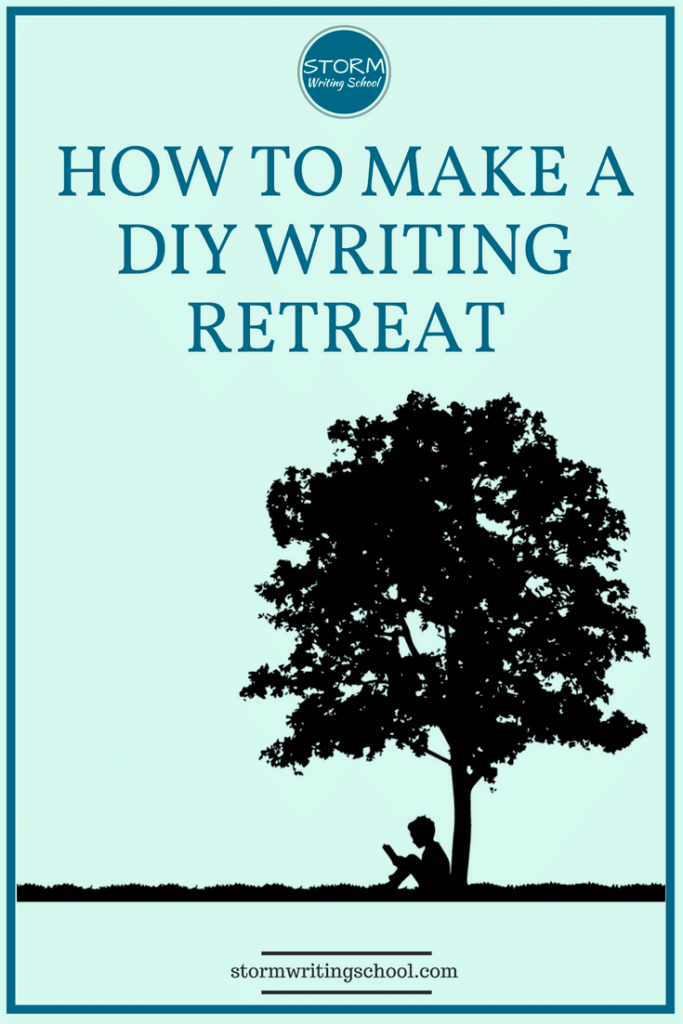I’m teaching this week at the Write by the Lake Writing Retreat in Madison, Wisconsin. It’s in a building right next door to this:

Pretty nice.
The Value of Retreats
Writers—well, we’re kind of weird. We dwell for much longer than normal on our own memories and/or on our imaginary friends. It’s incredibly energizing to surround yourself with other people who geek out over the same stuff.
Retreats invariably 1) spur you to write, 2) open up new directions, and 3) give you time to really ponder your work(s)-in-progress. If you can’t attend a scheduled conference or retreat, though, consider a DIY retreat.

Step 1: Get a space
Getting away from home can really provide a creativity boost. When we’re in our own dwellings, it’s much easier to fall back on the hundreds of comforts and distractions that we’re accustomed to resorting to: eating, wasting time on social media, and cleaning, for instance. When you change routine and get into a new space, the upkeep of which is not your responsibility, you may find you’re much more productive.
On the other hand, some people function best within the safe havens they’ve created for themselves at home. So leaving home is definitely not a requirement.
But getting yourself into a productive space is the first step toward retreating, which is, by definition, about finding a quiet place.
These days, if you can get away from home, you can look into an AirBNB or a VRBO. There are also writing residencies you can apply for. These are very low cost (they basically sponsor your artistry), but often much longer than the DIY retreat I’m talking about here.
Step 2: Find some other people
Community is key for writers. And if you share the costs, what may seem at first to be daunting becomes very reasonable. Your main costs in putting together a DIY retreat are rental, travel, and instruction (if you choose to make it an educational retreat). Add those up and divide by 3 or 5 or 8, and suddenly, you’ve got a very modest price tag for a fully customized retreat.
You can do it all in isolation, of course. For some, that’s as energizing as anything. But just remember that writing, like all forms of communication, is social. So there’s something to be said for the communal retreat.
Step 3: Schedule (and don’t)
Write, read, reflect, and enjoy yourself. Those are the objectives of the retreat.
Set aside 2-4 hours for writing per day. More than that, unless you’re used to it, may not actually be more productive for you.
Then schedule some planned leisure—a shared meal; an outing to a concert, play, or movie; some kind of exercise (hike, swim, bike, etc.).
And be sure to set aside time for reading and/or learning.
Retreats and residencies run by institutions have daily schedules that tell you the times for meals, classes, workshops, and writing time. It’s both freeing and motivating to have that schedule to work within.
A sample schedule:
- 8:00 breakfast
- 9:30-12:00 class/workshop/book discussion
- 12:30 lunch
- 1:30-4:00 writing time
- 4:00-5:00 hike
- 6:00 dinner
Step 4: Study and learn craft
Learning is an essential part of any retreat. In that new space, with like-minded people and a liberating and focused schedule, you’re primed to learn more about your craft. You might be able to find an instructor you can hire to come to you. You might be able to talk an experienced writer into joining the retreat (maybe you offer to cover their housing costs in exchange for some teaching).
Or if you have a decent internet connection, you can hire a writing instructor to talk with you via some kind of video chat (Skype, FaceTime, or Zoom, for instance).
Last month, I served as an instructor for a group of three women who put together a retreat nearby (Kristin Oakley, Tricia Wagner, and Shannon Anderson). Each day, I met with them from 9:30 to 12:30 to discuss a list of craft topics they came up with months prior. We also read and discussed a novel (The Immortalists by Chloe Benjamin).
If you can’t find an instructor, you can certainly do some workshopping of one another’s work and/or discuss a story or a craft book.
On a budget?
- Space = local library or park.
- Instructor = a craft book that everyone reads together.
- Cost = time off from work and a $12 book.
Read more
Melanie Bishop has some great articles on The Value of Writing Retreats and How to Make the Most of One.
This article is part of the Author Toolbox Blog Hop. To continue hopping through other great blogs in the monthly hop or to join, click here.
Hire me
Contact me (td@stormwritingschool.com) and check my availability if you have some dates in mind. You can send me a list of preferred class topics before the retreat and get some customized instruction on the issues you’re most interested in discovering more about. Test out my editing services, too.
SaveSave
SaveSave
SaveSave
SaveSave
SaveSave
SaveSave
SaveSave
SaveSave





5 Responses
Great post! Cost-sharing is such a great tip. I hadn’t thought about that aspect before. If you ever decide to add a blog tab in your main menu, let me know, and I’ll change which page the toolbox is being directed to for you. It might be easier for people to find your blog posts that way, but your site design is so clean and pretty, so I’m not sure it’s what you want. 🙂 I’ll add this to my Facebook schedule soon!
I suspect I’m not cut out for group writing retreats as I’ve been to two and spent all my time chatting …
But I do find I write more (and better) when I get out of the house and go to a cafe. Does that count? 😉
TD, are you on Twitter? If so, what’s your Twitter handle? I tweet most #AuthorToolbox posts, and like to tag the authors where possible.
Haha! I think both the social retreat and the solitary are valid and important. Not all writing involves actual typing. Chatting can lead to some breakthroughs.
I’m not on Twitter right now. Speaking of avoiding social interaction.
I like your example schedule. That kind of concrete example is really helpful.
Reading it, I think I’d be tempted to have 2 “writing sessions”, one in the morning and one in the afternoon, each for 90-120 minutes. I’d probably be inclined to have some kind of “writing workshop” before each, which would be optional, and for those who wanted to they could just go somewhere quiet and go right into writing time.
I also wonder if I would prefer the “outdoor activity” to be in the middle of the day (i.e. after lunch” or before dinner.
I often find that there’s a certain point where I need to step away, for a little while, and then come back to writing. One long session typically doesn’t help me.
I think your idea about the Air BnB is a great one too. One could book a place 15-30 minutes away from home (far enough to discourage repeatedly going back), while still close enough that one doesn’t need to really travel all that far.
I definitely like the idea.
One of these days I’d like to try that, a week of solid “writing time”.
If I may, would you advocate 1-2 people deciding on topics and activities, or opening it up for all in attendance to “vote” on what workshop topics/exercises appeal?
Great ideas about the schedule, Adam. I agree that scheduling 2 writing sessions is best.
As for topics, I think this kind of retreat is a very democratic one, and as such, I’d advocate opening it up for all in attendance to vote, but if that got too messy, you could have the group choose more topics than you may be able to get to and allow the instructor to select those s/he feels most prepared to address.